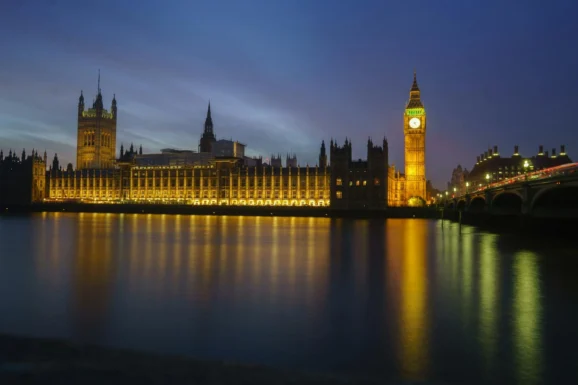MAGA made America great again. Could MEGA do the same for Britain?

Daniel Mark Harrison
- Published
- Opinion & Analysis

With Labour support plummeting and the right fragmented, Britain could be primed for its own “Make America Great Again” moment. Guest writer Daniel Mark Harrison argues that a bold, unifying movement — led by a charismatic figure with economic grit — could rally Middle England and beyond to a decisive Conservative resurgence
When Donald Trump entered the U.S. political arena in 2016 with the rallying cry “Make America Great Again,” the MAGA slogan was more than a simple catchphrase. For years under the Obama government, a right-wing movement of sorts had been coalescing in fractions all over the United States.
The Tea Party Movement was a coalition of libertarians, disaffected youth voters, conservatives and other populist right wing causes that sprang out of the subprime crisis. It was born in 2009 when CNBC reporter Rick Santelli called on the floor of the Chicago Mercantile Exchange for a “tea party” in response to then President Obama’s dramatic increase in healthcare spending and other unprecedented government bailouts of major corporations.
While the movement didn’t effect change in the White House at the subsequent election, it did result in a red wave in the 2010 midterms that ensured Republicans a victory in Congress and an increase in the number of seats they held in the Senate.
Fast-forward another half-decade, and a major appeal of Donald Trump was his ability to unify the Tea Party movement and rally it around a central cause: American identity and, specifically, the association of status with prosperity. All this was encapsulated in a 1980 quip by Ronald Reagan to “let’s Make America Great Again” that Trump shrewdly trademarked when he was mulling a Presidential run.
In many ways, the United Kingdom of today very much resembles the U.S of the early to mid-2010s in that there is a deeply unpopular majority left-wing government in place. An apparent minority now claim to support Kier Starmer despite his sweeping election victory only a year ago. A recent poll found that Labour’s government had seen the largest drop in support of any newly elected government in 40 years. A Parliamentary petition this week calling for a snap election has at the time of writing garnered more than 750,000 of the 100,000 required signatures allowing it to be tabled as a motion in the House of Commons. The petition even prompted a response from the Labour government, which said it had been elected on “a mandate of change.”
That, too, feels familiar. Behind the façade of popular appeal, Starmer’s clampdowns on free speech have gone down with voters about as well as Obama’s own surveillance programs, exposed by CIA whistleblower Edward Snowden. In today’s post-Covid climate, many see the arrest and prosecution of people for expressing views on social media as just as distasteful as Washington’s pursuit of whistleblowers like Snowden and Chelsea Manning.
A case in point is Maxie Allen and Rosalind Levine, the parents of a nine year old girl who were picked up by police and reportedly questioned for 11 hours after complaining about their daughter’s headteacher on WhatsApp groups. Most infamous was the case of Lucy Connolly, who posted an online rant saying she wanted to set fire to asylum seekers’ housing after the killing of three young white girls at a Taylor Swift-themed dance club by a man who was not of English descent. “If this makes me racist, so be it!” she wrote. At the time she had about 9,000 followers on X. Her message was reportedly reposted 940 times and viewed 310,000 times, before she deleted it three and a half hours later.
The post landed Connolly in jail for 31 months after she admitted inciting racial hatred – a sentence described as “morally repugnant” by Rupert Lowe, the independent MP for Great Yarmouth.
Like the Obama administration of 2008-2016, Starmer’s government appears to be tone deaf to the unpopularity of such heavy-handed statist intervention into citizens’ everyday lives. The Labour government recently introduced the Online Safety Act, a law ostensibly designed to clamp down on websites offering pornography and suicidal idealisation to children. Many see the Act as another tool for Starmer, a former public prosecutor, to restrict free expression and exert greater control over people’s lives. A recent poll found support for it had fallen from 80% to 69% in favour, with just 41% of parents thinking it would be effective in keeping their children safer online.

The problem for the right in the UK is that it is fragmented between extremes, much like the right-wing movements of the U.S were in the post-subprime era. On the far right are political folk heroes like Tommy Robinson, an anti-immigration, anti-Islamist conservative who views the entire establishment as the enemy. Then there are Nigel Farage and Richard Tice — also anti-immigration, but more aligned with the traditional establishment. The bulk of the right, however, is made up of middle-class Home Counties parents who backed Liz Truss, Britain’s second shortest-serving Prime Minister (lasting just a week).
These divisions within the right-wing electorate mean that, even when there is political overlap, the factions are far from natural allies. They span very different social classes and backgrounds; Farage and Robinson are not friends, for example, despite sharing similar views on asylum seekers.
Trump’s answer to the fragmentation of the American right during the Obama era was to take over the country’s dominant right-wing party — the Republicans — and reshape it with a more independently minded, populist force. Despite losing the 2020 election to Joe Biden, so binding was this formula that it propelled him back into the White House last year with such a sizeable majority that he became the first Republican President to win the popular vote in over two decades.
A similar approach could work in UK politics if, rather than splinter groups like Reform dominating the headlines, the larger Conservative Party either elected a leader of real substance or merged with Reform and installed one of its more combative MPs as leader.
With discontent running high across Middle England, a “Make England Great Again” (MEGA) movement — or a similar campaign inclusive of Scotland and Northern Ireland — led by a charismatic, battle-hardened entrepreneur with economic common sense could rally the right to a decisive electoral victory. If the next right-wing government delivered on tough policies — such as expanding domestic oil drilling in the North Sea to cut energy costs, tightening immigration and domestic controls, and aggressively deregulating industry — this new movement could unite the right, rather than remain as fragmented as it is today. But this would demand that today’s Conservative politicians abandon their fence-sitting style of governance and adopt a bolder ideology, one focused on actively challenging left-wing policies rather than appeasing them.
Thatcherism drew its strength from broad appeal, winning over both working-class voters — who gained the chance to buy their council houses and often ended up better off — and industry leaders, who benefited from deregulation and privatization. A MEGA movement in Britain could result in a revival of that Thatcherist era spirit, the way a MAGA one has brought back Reaganist sentimentalities in the U.S today. That would be a force with staying power and might, actually, make Great Britain great again.
Daniel Mark Harrison is an entrepreneur, innovator and business writer based in the Middle East and Asia. He is the owner of Harrison WLL, a Bahrain-based private investment company and the Publisher of Daily Goat, an online tabloid. He is a recognised digital currency evangelist and has written for The Wall Street Journal, Forbes, Washington Post, Newsweek and other mainstream business and news publications.
Main photo: Polina Zimmerman/Pexels
RECENT ARTICLES
-
 Europe cannot call itself ‘equal’ while disabled citizens are still fighting for access
Europe cannot call itself ‘equal’ while disabled citizens are still fighting for access -
 Is Europe regulating the future or forgetting to build it? The hidden flaw in digital sovereignty
Is Europe regulating the future or forgetting to build it? The hidden flaw in digital sovereignty -
 The era of easy markets is ending — here are the risks investors can no longer ignore
The era of easy markets is ending — here are the risks investors can no longer ignore -
 Is testosterone the new performance hack for executives?
Is testosterone the new performance hack for executives? -
 Can we regulate reality? AI, sovereignty and the battle over what counts as real
Can we regulate reality? AI, sovereignty and the battle over what counts as real -
 NATO gears up for conflict as transatlantic strains grow
NATO gears up for conflict as transatlantic strains grow -
 Facial recognition is leaving the US border — and we should be concerned
Facial recognition is leaving the US border — and we should be concerned -
 Wheelchair design is stuck in the past — and disabled people are paying the price
Wheelchair design is stuck in the past — and disabled people are paying the price -
 Why Europe still needs America
Why Europe still needs America -
 Why Europe’s finance apps must start borrowing from each other’s playbooks
Why Europe’s finance apps must start borrowing from each other’s playbooks -
 Why universities must set clear rules for AI use before trust in academia erodes
Why universities must set clear rules for AI use before trust in academia erodes -
 The lucky leader: six lessons on why fortune favours some and fails others
The lucky leader: six lessons on why fortune favours some and fails others -
 Reckon AI has cracked thinking? Think again
Reckon AI has cracked thinking? Think again -
 The new 10 year National Cancer Plan: fewer measures, more heart?
The new 10 year National Cancer Plan: fewer measures, more heart? -
 The Reese Witherspoon effect: how celebrity book clubs are rewriting the rules of publishing
The Reese Witherspoon effect: how celebrity book clubs are rewriting the rules of publishing -
 The legality of tax planning in an age of moral outrage
The legality of tax planning in an age of moral outrage -
 The limits of good intentions in public policy
The limits of good intentions in public policy -
 Are favouritism and fear holding back Germany’s rearmament?
Are favouritism and fear holding back Germany’s rearmament? -
 What bestseller lists really tell us — and why they shouldn’t be the only measure of a book’s worth
What bestseller lists really tell us — and why they shouldn’t be the only measure of a book’s worth -
 Why mere survival is no longer enough for children with brain tumours
Why mere survival is no longer enough for children with brain tumours -
 What Germany’s Energiewende teaches Europe about power, risk and reality
What Germany’s Energiewende teaches Europe about power, risk and reality -
 What the Monroe Doctrine actually said — and why Trump is invoking it now
What the Monroe Doctrine actually said — and why Trump is invoking it now -
 Love with responsibility: rethinking supply chains this Valentine’s Day
Love with responsibility: rethinking supply chains this Valentine’s Day -
 Why the India–EU trade deal matters far beyond diplomacy
Why the India–EU trade deal matters far beyond diplomacy -
 Why the countryside is far safer than we think - and why apex predators belong in it
Why the countryside is far safer than we think - and why apex predators belong in it


























